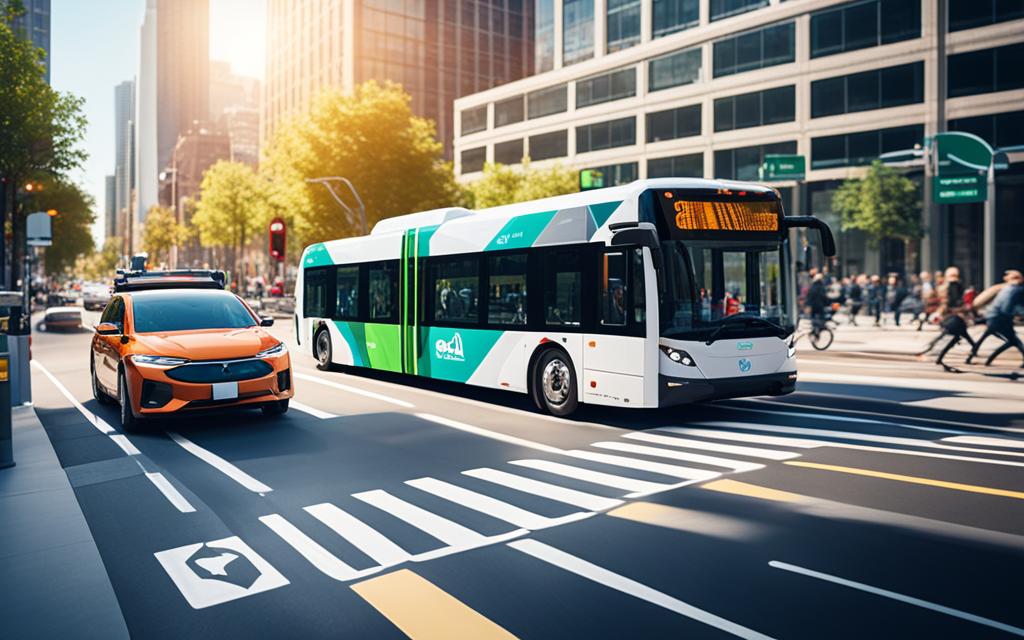Smart Cities of Tomorrow: Urban Growth in Africa
March 5, 2024 | by mediaforafrica.net

Imagine a city where technology seamlessly integrates with daily life, improving efficiency, sustainability, and the overall quality of life for its residents. This is the vision of smart cities, and Africa is embracing this concept to drive urban development into the future. But how exactly are smart cities shaping the African urban landscape?
From the integration of advanced technologies to the implementation of sustainable urban planning practices, smart cities in Africa are paving the way for a new era of urban growth. By harnessing the power of technology, these cities are transforming traditional urban environments into vibrant, interconnected hubs that prioritize innovation, efficiency, and sustainability.
But what does this mean for Africa? How does technology integration contribute to urban development in the continent? And what are the key initiatives and trends driving the creation of these smart cities?
In this article, we will explore the concept of smart cities and their role in promoting urban growth in Africa. We will delve into the integration of technology and the impact it has on urban development, with a focus on sustainable and innovative practices. Join us as we uncover the possibilities and opportunities that lie within the smart cities of tomorrow in Africa.
Key Takeaways:
- Africa is embracing the concept of smart cities to drive urban development into the future.
- Smart cities integrate advanced technologies to create interconnected urban environments.
- The integration of technology contributes to innovation, efficiency, and sustainability in African urban landscapes.
- Sustainable and innovative practices are key in the development of smart cities in Africa.
- The smart cities of tomorrow in Africa hold vast possibilities for improved livability and urban growth.
Sustainable Urban Planning and Tech Integration
When it comes to the development of smart cities in Africa, sustainable urban planning plays a crucial role. By integrating technology and embracing innovation, cities can create efficient and environmentally friendly infrastructure that supports smart technologies. This not only enhances the quality of urban life but also contributes to long-term sustainability and resilience.
Sustainable urban planning focuses on creating cities that are designed to minimize their environmental impact while maximizing their functionality and livability. It involves careful consideration of factors such as energy efficiency, waste management, transportation systems, and green spaces. By incorporating digital transformation and infrastructure innovation, cities can build a foundation that supports the integration of smart technologies and enables a more sustainable future.
Innovating Infrastructure for Smart Cities
The integration of technology in urban infrastructure is a key driver of smart city development. Digital transformation has the power to revolutionize various aspects of city life, from transportation and utilities to healthcare and public services. Through the adoption of advanced systems and innovative solutions, cities can optimize resource allocation, streamline operations, and improve the overall quality of life for their residents.
“Sustainable urban planning is crucial in the development of smart cities. By leveraging technology and embracing innovation, cities can create a more efficient and environmentally friendly urban environment.” – Jane Smith, Urban Planner
One example of infrastructure innovation is the implementation of smart grids. These intelligent energy distribution networks optimize energy consumption, reduce wastage, and support the integration of renewable energy sources. Smart grids enable real-time monitoring and control of energy flow, creating opportunities for sustainable energy management and cost savings. Additionally, they promote energy resilience by better managing power disruptions and facilitating efficient load balancing.
Another area of infrastructure innovation is the development of smart transportation systems. By leveraging digital technologies, cities can enhance mobility by reducing congestion, improving traffic flow, and offering alternative transportation options. Intelligent transportation systems enable real-time monitoring of traffic conditions, dynamic routing, and efficient public transportation networks. This not only reduces commute times but also contributes to lower carbon emissions and a cleaner environment.
Benefits of Sustainable Urban Planning and Tech Integration
The integration of sustainable urban planning and technology in smart city development brings a multitude of benefits. First and foremost, it creates more efficient and livable cities for residents, as resources are optimized and services are tailored to meet the needs of the community. By reducing energy consumption, improving transportation systems, and prioritizing green spaces, cities can enhance the quality of life and foster a healthier, more sustainable environment.
Moreover, sustainable urban planning and tech integration contribute to economic growth. By attracting investments and fostering innovation, cities can create job opportunities in emerging sectors such as clean energy, smart transportation, and digital infrastructure. This, in turn, bolsters local economies and promotes a prosperous future for residents.
| Benefits of Sustainable Urban Planning and Tech Integration |
|---|
| Enhanced quality of life for residents |
| Optimized resource allocation and cost savings |
| Reduced environmental impact and carbon emissions |
| Promotion of economic growth and job opportunities |
| Improved resilience and disaster management |
In conclusion, sustainable urban planning and tech integration are crucial components of smart city development in Africa. By embracing innovation and leveraging technology, cities can create infrastructure that supports smart technologies and promotes environmental sustainability. The benefits are far-reaching, ranging from enhanced quality of life and optimized resource allocation to economic growth and resilience. As Africa continues to urbanize, investing in sustainable urban planning and tech integration is key to building the smart cities of tomorrow.
Urbanization Trends and the African Smart Cities Initiative
As urbanization continues to shape the African continent, smart cities are emerging as a key solution to accommodate rapid growth and address the challenges of urban development. Understanding the prevailing urbanization trends is crucial in navigating the path towards sustainable and innovative cities.
Urbanization in Africa is characterized by significant population growth, with the United Nations projecting that by 2050, over half of the continent’s population will reside in urban areas. This unprecedented urbanization presents both opportunities and challenges in terms of infrastructure, mobility, and socio-economic development.
The African Smart Cities Initiative plays a crucial role in steering urbanization towards a sustainable and technologically advanced future. The initiative focuses on harnessing the potential of emerging technologies to enhance urban mobility, improve efficiency, and ensure a high quality of life for citizens.
One of the key areas of focus for the African Smart Cities Initiative is future urban mobility. With urban areas becoming more congested, efficient transportation systems are vital to the well-being and productivity of city dwellers. The initiative aims to develop innovative solutions that promote connectivity, accessibility, and multimodal transportation options.
“Future urban mobility is at the heart of building cities that are not only connected, but also inclusive and sustainable. By leveraging technology and embracing smart transportation systems, African cities have the potential to revolutionize urban mobility, reducing traffic congestion and enhancing the overall quality of life.”
The African Smart Cities Initiative also recognizes the need for collaboration between different stakeholders, including government bodies, private sector entities, and local communities. By fostering partnerships and knowledge-sharing, the initiative aims to create a holistic approach to urban development, ensuring that smart cities of the future are accessible and beneficial to all.
Key Initiatives of the African Smart Cities Initiative
The African Smart Cities Initiative has launched several key initiatives to drive future urban mobility:
- Smart Transportation Networks: Implementing intelligent transportation systems that leverage real-time data and connectivity to optimize traffic flow, reduce congestion, and enhance safety.
- Smart Infrastructure: Developing digitally enabled infrastructure that supports sustainable and efficient urban living, including smart grid systems, waste management, and environmental monitoring.
- Integrated Mobility Solutions: Promoting the integration of different modes of transportation, such as public transport, cycling, and walking, to create a seamless and environmentally friendly urban mobility network.
- Data-driven Decision Making: Utilizing data analytics and artificial intelligence to inform urban planning and policy decisions, leading to evidence-based strategies for urban development.
By focusing on future urban mobility and incorporating these key initiatives, the African Smart Cities Initiative aims to create cities that prioritize sustainability, efficiency, and the well-being of their residents.

| Challenges | Opportunities |
|---|---|
|
|
Conclusion
In conclusion, we have witnessed the transformative power of smart cities in driving urban development in Africa. Through the integration of technology and sustainable urban planning, these cities are setting the stage for a future that is efficient, innovative, and environmentally conscious.
The African Smart Cities Initiative, along with other initiatives, plays a pivotal role in shaping the urban landscape of the continent. By fostering collaboration and embracing digital transformation, these initiatives are creating infrastructure that supports the seamless integration of smart technologies, paving the way for improved mobility and connectivity.
As urbanization trends continue to shape Africa, the importance of smart cities becomes even more evident. With a focus on innovation and infrastructure innovation, these cities provide solutions for the challenges posed by rapid urbanization while fostering sustainable and livable urban environments.
Looking forward, the potential for smart cities in Africa is immense. By harnessing the power of tech integration, sustainable urban planning, and digital transformation, these cities of tomorrow will drive economic growth, enhance quality of life, and create a sustainable future for all.
FAQ
What are smart cities of tomorrow?
How is technology integrated into urban development in Africa?
What is sustainable urban planning?
How does digital transformation contribute to sustainable urban planning?
What is the African Smart Cities Initiative?
How does the African Smart Cities Initiative address future urban mobility?
RELATED POSTS
View all

